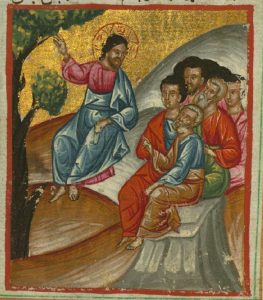Illuminations on the Lectionary readings for July 24, 2022 (Pentecost 7C)
First Reading (Track One): Hosea 1:2-10
“Your Kingdom come.” In Sunday’s Gospel we will hear Luke’s version of Jesus teaching his apostles to pray.

Jesus teaching his disciples (1684), from an Arabic manuscript of the Gospels, copied in Egypt by Ilyas Basim Khuri Bazzi Rahib (likely a Coptic monk). The Walters Art Museum, Baltimore. (Click image to enlarge.)
Sunday’s Track One readings begin, though, with a prophecy of the loss and restoration of another kingdom, Israel. Using language as grim as we heard from the prophet Amos in the past two weeks, the prophet Hosea uses the disturbing metaphor of marriage to a prostitute to warn Israel and Judah that they face destruction. Even the names of the children of this marriage, translated from the original Hebrew, hold up startling images: “God Sows,” “Not Pitied,” and “Not My People.” The concluding verses of this passage offer hope for the future, though, as “not my people” becomes “children of the living God.”
First Reading (Track Two): Genesis 18:20-32
The Track Two first reading last week told of Abraham meeting three strangers in the desert and hearing from them that he and his wife, Sarah, will have offspring as plentiful as the stars. By this point Abraham has apparently become comfortable in his relationship with God. He bargains and argues with the Creator in hope of saving Sodom from violent destruction. Why did Sodom deserve this? God’s wrath with the Sodomites did not have to do with sexual sin, but with their selfish failure to be righteous. As the Prophet Ezekiel will later declare, “Sodom and her daughters had pride, excess of food, and prosperous ease, but did not aid the poor and needy.” This covenantal call to righteous action runs through the Bible from Moses through the prophets to Jesus.
Psalm (Track One): Psalm 85
Harmonizing with Hosea’s vision of an angry God, today’s Psalm speaks of a thankful people’s grateful relief. They had feared that their sins would earn God’s fury and wrathful indignation. But now they look forward to the mercy and salvation that they hope to receive from a God who remains faithful regardless of their wrongs. When we listen to God, the Psalmist sings, we hear mercy meeting truth while righteousness and peace join in a kiss.
Psalm (Track Two): Psalm 138
The relationship of this Psalm to the destruction of Sodom may not seem apparent at first. Listen closely, though, and you may hear a distant echo of Abraham persuading God not to give up on the people but to look to those who remain righteous and who thank God for their many blessings. God responds when we call, the Psalmist sings; we know that God’s right hand will save us; God’s steadfast love endures.
Second Reading: Colossians 2:6-15 (16-19)
The church at Colossae was a community of new believers, looking forward to being raised with Christ through faith in God’s power. But they were a Gentile community, too, still wrestling with the pagan beliefs of their Greek culture. The author of this letter, thought to be a later follower writing in Paul’s name, warns against false teachings, “philosophy and empty deceit … festivals, new moons or sabbaths.” God sets that aside with earthly rules and law. In words reflecting those of Jesus teaching his followers how to pray, the writer of Colossians assures them that God has forgiven our trespasses.
Gospel: Luke 11:1-13
Using tropes that would have been familiar to the apostles from Jewish prayers, the prayer that Jesus teaches them speaks of righteousness in terms that the prophets might have used: Honor God’s name, share our food, forgive our debts, do to others as we would have them do to us. Do these things and we help build God’s kingdom, not only in Heaven but right here on Earth. After teaching the apostles this prayer, Jesus went on in the following verses to talk about prayer in language rich in metaphor. Perhaps the demanding friend who won’t give up asking his neighbor for bread at midnight underscores the importance of sharing our bread and loving our neighbors no matter what the circumstances. Just as God opens the door when we knock, so should we do the same for our neighbor.
